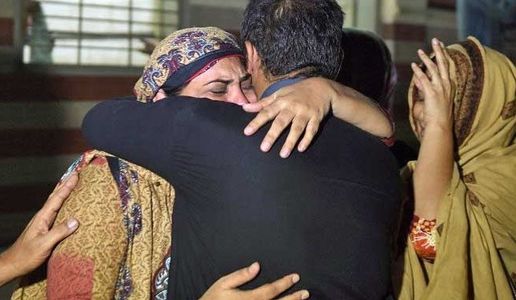Najam Explains Climate Change & Extreme Weather

As Southern Pakistan continues to swelter in a severe heat wave that has left some 1400 dead, there is much discussion on the link between global climate change and a spate of extreme weather events in South Asia and globally. Prof. Adil Najam, Dean of the Frederick S. Pardee School of Global Studies at Boston University, and an expert on climate and development policy in developing countries has been explaining the nature of that linkage to media in Pakistan.
Najam was interviewed and quoted in detail in two feature reports on the subject published in The Friday Times (July 3, 2015) and The News on Sunday (July 5, 2015).
Speaking to The News on Sunday, the Sunday edition of Pakistan’s largest English daily, Najam said that an increasing incidence of extreme weather events – not just in Pakistan, but around the globe – may be nature’s way of warning us on the impact of climate change – but that we are not listening. The article, titled “Coping with Climate Change” quoted Najam to make the point:
“Science is beginning to see the patterns in the frequency and ferocity of extreme events around the world,” says Dr Adil Najam, a Pakistani scholar who is dean of the Pardee School of Global Studies at Boston University. “We are beginning to realise that when climate change exacerbates it can bring not only localised shocks, but also global implications. And when these become repeated and more frequent can cripple communities and have knock-on impacts elsewhere,” he explains.
“It’s reminding us of just how dependent we, as a species, remain on nature and its services. Despite all of our technological advances and global affluence, each time a natural calamity hits it shows us just how helpless we become in the face of nature’s wrath,” he says.
Unfortunately, says Najam, we seem to be ignoring the alarm bells. “Nature is saying, don’t mess with me; respect my limits but human arrogance continues to ignore that message,” he says and warns, “We will do so at our own cost.”
You can read the entire article here.
Earlier the Pardee School Dean was interviewed by The Friday Times, Pakistan’s most influencial news weekly, for a feature article entitled “Climate Change 101” (July 3, 2015). The feature looked in depth at the links between climate change and the heat wave that had hit the megacity of Karachi (population: 10 million).
Najam suggested that the real issue at stake is not just the weather event but the lack of good governance, which exacerbates its impacts. The article quotes Najam extensively to make this point:
“The situation in Karachi demonstrates the types of challenges that a planet with a changing climate may pose; especially in mega-cities. While on the one hand the world has to continue and accelerate its efforts to reduce carbon emissions (mitigation) as a way of managing climate change, it is equally important – and even more important for developing countries like Pakistan – to prepare for the impacts of climate change (adaptation).”
Karachi’s plight has a lesson to teach to Pakistan, one that the country repeatedly refuses to learn. “Pakistan’s ultimate climate change challenge is about governance and about development. What this means is that in a state of maldevelopment, unequal access to basic human services, and especially bad governance the impacts of weather calamities will always multiply, as they did in Karachi,” Dr. Najam explained.
“Better governance in Karachi would not have changed the heat or the temperature, but better governance would have certainly made sure that so many people did not die,” he said
“This would have given them electricity and water when they needed it, would have given them health facilities, would have given them better working conditions, would have given them a place to sit in a shade rather than literally die on the streets,” he added as a matter of fact.
In terms of policy steps to take, Najam argued that the challenge at hand is not policy content but policy implementation:
The real question then steers us away from policymakers and pushes us more towards policy. Dr. Najam said that Pakistan has little to worry about in that department. “This is not a question of forming a ministry or creating another document. Real policy will come when policymakers put climate change at the centre of their work – and not as another ‘khuda line’ ministry,” he asserted.
“That means putting climate decisions at the heart of development decisions, of economic decisions,” he informed.
Dr. Najam expects little change until policy makers that have nothing to do with the climate policy own it as their own. “I really do not expect to see change until our key finance, economic and development decision makers see themselves as the custodians of climate policy,” he said. However, of course, there is a clash.
“The best example is energy policy. Not only have our energy planners been oblivious of the climate implications of their decisions, they have often been outright hostile to them. That is the type of attitude that led to the building up of the crisis we now see unfolding in Karachi,” he added.
You can read the entire article here.
Najam is the Inaugural Dean of the Pardee School. Earlier, he served as Vice Chancellor (equivalent to president) of the Lahore University of Management Sciences (LUMS) in Lahore, Pakistan (2011-13) and as the Director of the Boston University Pardee Center for the Study of the Longer-Range Future (2007-11). He was a co-author for the Third and Fourth Assessments of the Intergovernmental Panel on Climate Change (IPCC) and serves on the UN Committee on Development (CDP). Learn more about him here.